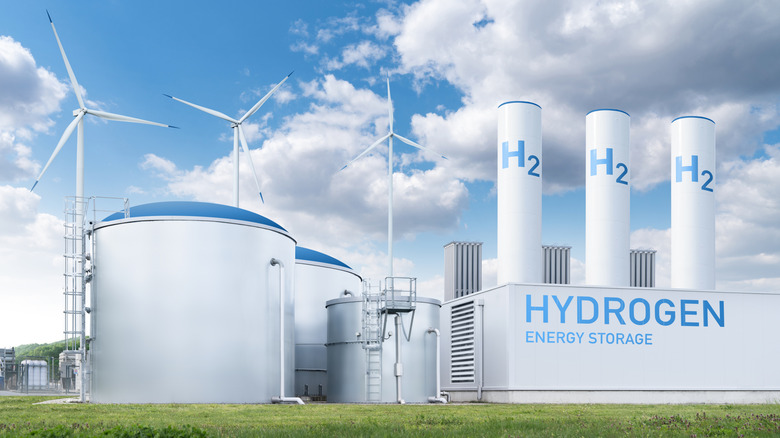This US Airline Just Took A Major Step Toward Offering Zero Emission, Eco-Friendly Flights
Zero-emission flights may still seem like a far-off dream, but one of the world's largest airlines is taking a step that signals it is serious about becoming an eco-friendly airline and making air travel more sustainable. American Airlines has agreed to a conditional purchase of 100 hydrogen-electric engines from ZeroAvia, an aircraft developer whose technology emits only water vapor — unlike traditional jet engines, which release carbon dioxide and other greenhouse gases that warm the planet.
"Having support from the world's largest airline is a strong indication of the progress we're making on the development of hydrogen-electric, zero-emission flight," said ZeroAvia founder and CEO Val Miftakhov in American Airlines' press release. The airline also invested an undisclosed amount in ZeroAvia's Series C funding round, a stage in startup investment that helps companies quickly scale up their technology. This financial support signals that the airline isn't just curious about hydrogen flight — it's betting on it.
As you might expect, we're still a long way from boarding a hydrogen-powered American Airlines flight for a cross-country trip. ZeroAvia is currently testing hydrogen-electric engines designed to power 10- to 20-seat aircraft on short-distance routes. Much research and development is still needed before these engines can be used in commercial passenger jets.
Environmental concerns and safety fears may hold back hydrogen flight
Like many alternative-energy solutions, hydrogen-electric planes aren't guaranteed to be as eco-friendly as they sound. While hydrogen fuel can be produced using water and renewable resources (called green hydrogen), it's often made from natural gas — a process that undercuts hydrogen's environmental benefits because it still relies on fossil fuels, which are problematic for the environment. Green hydrogen is therefore necessary to achieve zero-emission flights.
The Aviation Environment Federation has also raised concerns about the non-CO2 impacts of hydrogen aircraft, such as contrails. Contrails — the clouds of condensed water that trail behind planes — can trap heat in the atmosphere and may have a greater warming effect than the carbon emissions from conventional fuel. More research is needed to determine whether contrails from hydrogen planes will have less or more of an environmental impact than those from traditional aircraft.
Even if American Airlines and ZeroAvia succeed in overcoming sustainability and technology hurdles, they'll face the challenge of winning over public opinion. Hydrogen fuel still evokes anxiety for many, thanks in part to the infamous Hindenburg disaster — famously depicted on a Led Zeppelin album cover — a 1937 crash that killed 36 people when a hydrogen-fueled airship caught fire.
Those fears were renewed in 2022 when a ZeroAvia hydrogen test plane crashed. Fortunately, no one was harmed, and the company said hydrogen fuel was not the cause. Still, while fear around hydrogen-fueled engines remains mostly anecdotal, the public will need convincing to feel safe boarding these planes.
What could the future look like with hydrogen energy?
It's hard to predict what lies ahead for hydrogen-powered aviation, but experts say the cost of inaction may be higher than the price of innovation. The International Civil Aviation Organization predicts (via European Commission) that if we continue to fly with traditional aircraft, flight emissions will triple by 2050 compared to 2015 levels, potentially leading to irreversible changes in the Earth's ecosystems.
There are still many obstacles to overcome, but the long-term, exciting potential in aviation change is enormous. In the future, hydrogen energy could be used to power everything from cargo ships and city buses to buildings and homes. Some of this technology is already available: You can buy a hydrogen car, for instance, though choices are limited and fueling infrastructure remains sparse compared to electric vehicle charging stations.
Still, hydrogen energy's promise continues to grow, and for eco-conscious adventurers, American Airlines may be an airline to watch. "We are excited to contribute to this industry development and look forward to exploring how these engines can support the future of our airline as we build American Airlines to thrive forever," said the airline's chief financial officer, Derek Kerr, in its press release.


